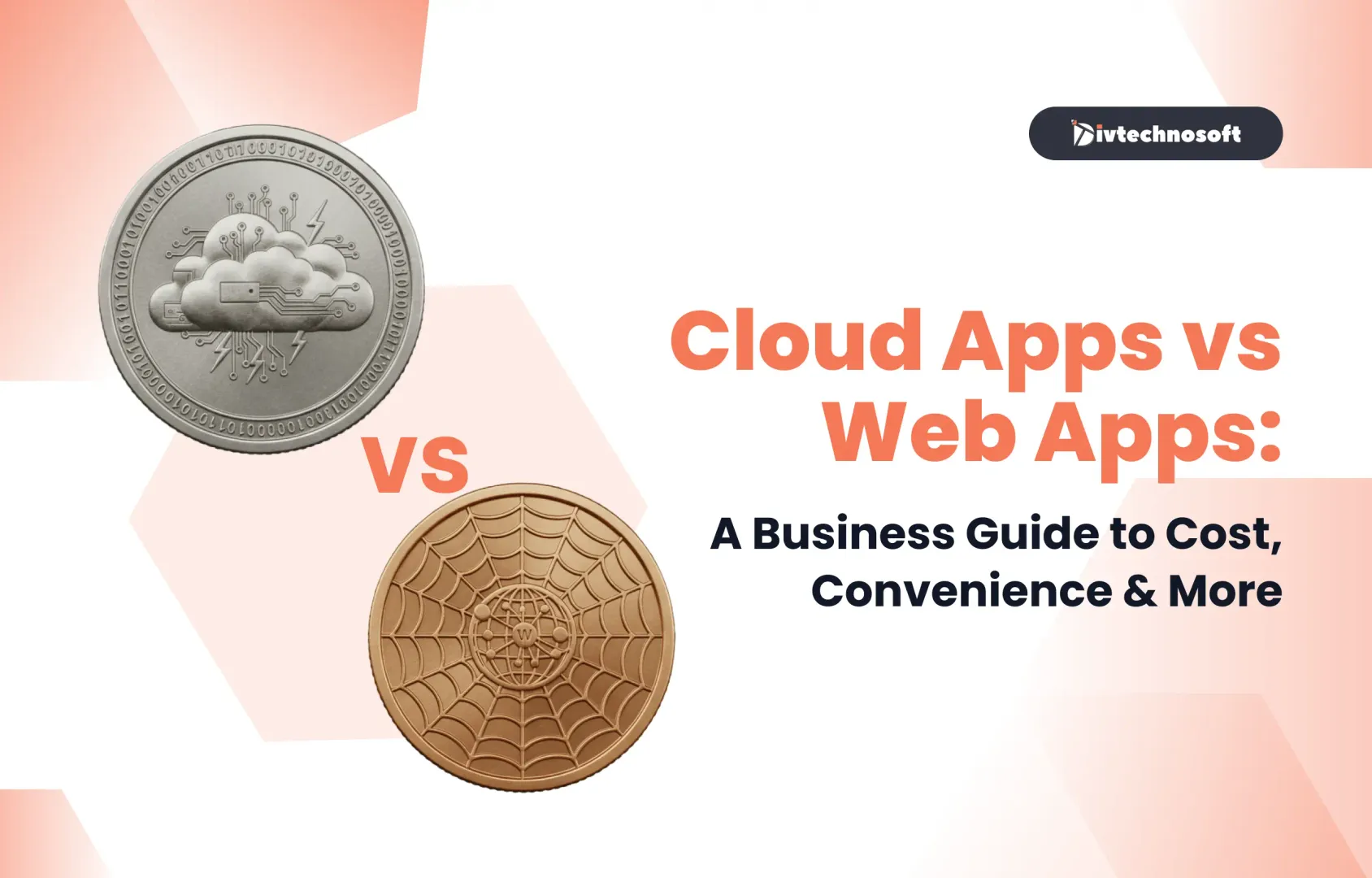From Click to Cart: Revolutionizing E-Commerce with Mobile App Innovations
Discover how mobile app development is transforming e-commerce in 2024. Explore key trends like AR/VR, AI personalization, PWAs, and more shaping seamless, engaging, and innovative online shopping experiences for the future.

In 2024, the landscape of online shopping is transforming rapidly, thanks to the rise of mobile apps. Imagine this: you’re sitting at home, scrolling through your favorite shopping app on your phone. With just a few taps, you find exactly what you want, no crowded stores or long lines. This is the magic of online shopping today, and it’s all thanks to mobile apps that are changing the way we buy. As we explore ecommerce technology trends, it’s clear that innovations in mobile technology are reshaping our shopping experiences and making convenience a top priority for consumers. This is the new reality of shopping, made possible by these advancements.
Mobile commerce, or m-commerce, is growing rapidly as more people use their smartphones and tablets to shop online. This shift gives businesses a chance to connect with customers in a more personal and engaging way. Today’s shopping experience is about more than just buying; it’s about creating a smooth and enjoyable journey for customers.
In this blog, we’ll explore the latest trends in mobile app development that are reshaping the e-commerce landscape. Whether you’re a business owner aiming to build customer loyalty or a shopper seeking a more enjoyable experience, understanding these changes is essential. Join us as we explore how these innovations are making the path from click to cart more enjoyable for everyone involved!
Market Overview
Global retail eCommerce sales reached about $5.8 trillion in 2023 and are projected to grow by 39% to over $8 trillion by 2027. With these impressive numbers, businesses have no choice but to keep moving forward. To stand out from competitors, they are constantly looking for new ways to improve the shopping experience for their users.
As a result, new innovations are always emerging, benefiting businesses that stay ahead of the curve. To provide the best user experience, it’s crucial to stay updated on the latest technologies and trends.
The eCommerce industry has recently seen significant growth and is expected to reach approximately $5,145 billion by 2029. In 2023, U.S. online sales hit $1.137 trillion, marking a 9.3% increase. By 2024, it’s estimated that over 21.2% of all retail sales will take place online.
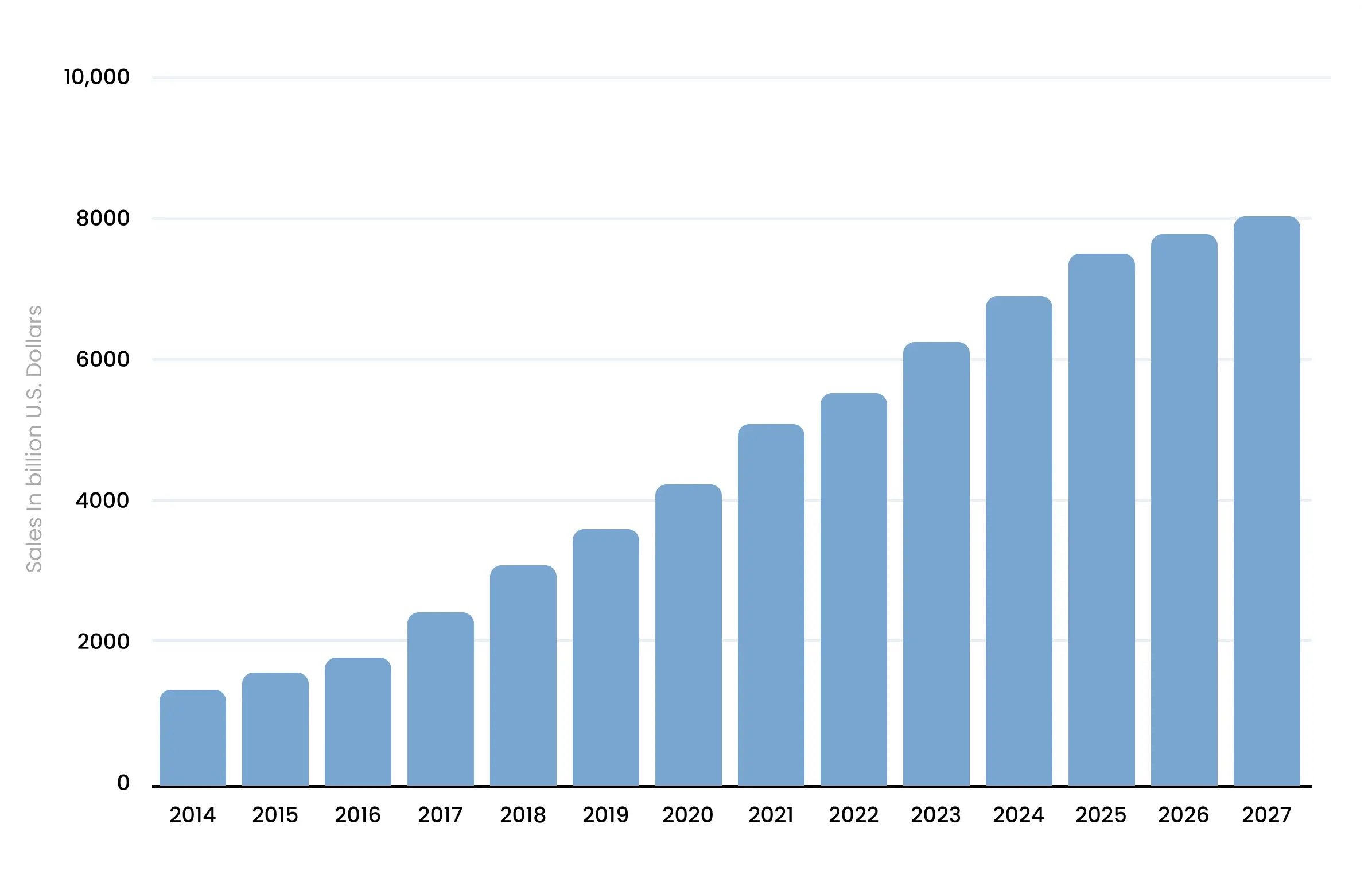
The Impact of Mobile Apps on E-Commerce
Mobile apps have revolutionized e-commerce, transforming how consumers shop and how businesses operate. Here are some key impacts:
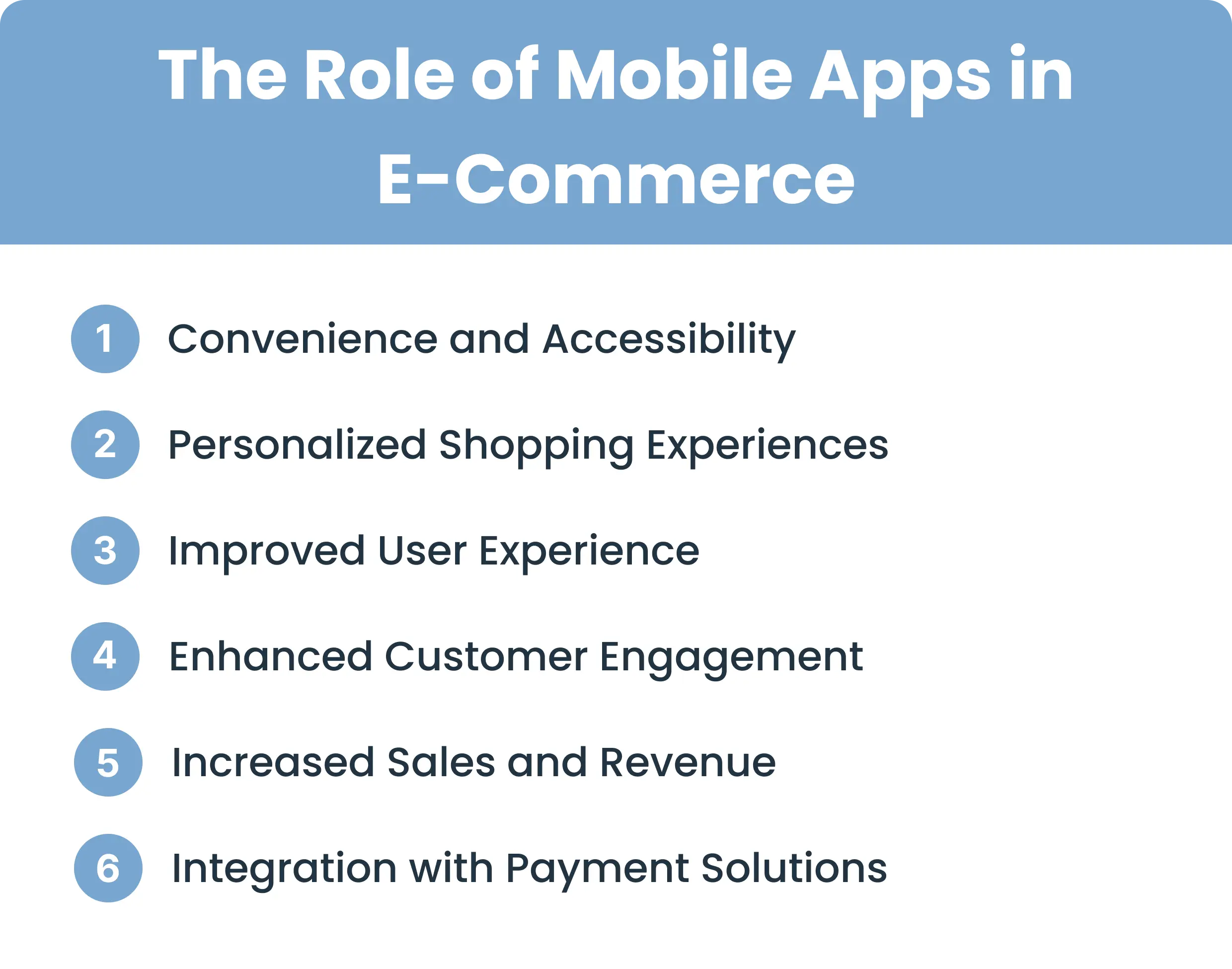
1. Convenience and Accessibility
Mobile apps allow shoppers to browse and buy products anytime and anywhere. This ease of access means consumers can shop while they’re traveling, at home, or even while waiting in line, leading to more spontaneous purchases.
2. Personalized Shopping Experiences
Many apps use data analytics to offer personalized recommendations based on a user’s preferences and past behavior. This customized approach enhances the shopping experience, making it more engaging and relevant.
3. Improved User Experience
Mobile apps are typically designed for ease of use, with user-friendly navigation, quick loading times, and smooth checkout processes. Features like one-click purchasing make it faster and simpler for customers to complete their transactions.
4. Enhanced Customer Engagement
Mobile apps enable businesses to connect with customers through push notifications, promotions, and loyalty programs. This direct line of communication helps keep users informed and engaged, encouraging them to return for more purchases.
5. Increased Sales and Revenue
With the convenience of mobile shopping, many businesses report higher conversion rates and increased sales. Users are more likely to make purchases through an app than a mobile website, driving revenue growth.
6. Integration with Payment Solutions
Mobile apps often integrate with various payment options, including digital wallets and contactless payments. This flexibility simplifies the checkout process and builds customer trust.
The Role of User Experience in Mobile E-Commerce
User experience (UX) plays a crucial role in mobile e-commerce, directly influencing customer satisfaction, retention, and sales. A seamless and engaging user experience can significantly enhance shopping behaviors and outcomes. Keeping up with ecommerce technology trends is key for businesses that want to enhance UX, as these trends often determine what features and tools customers expect from their shopping experiences.
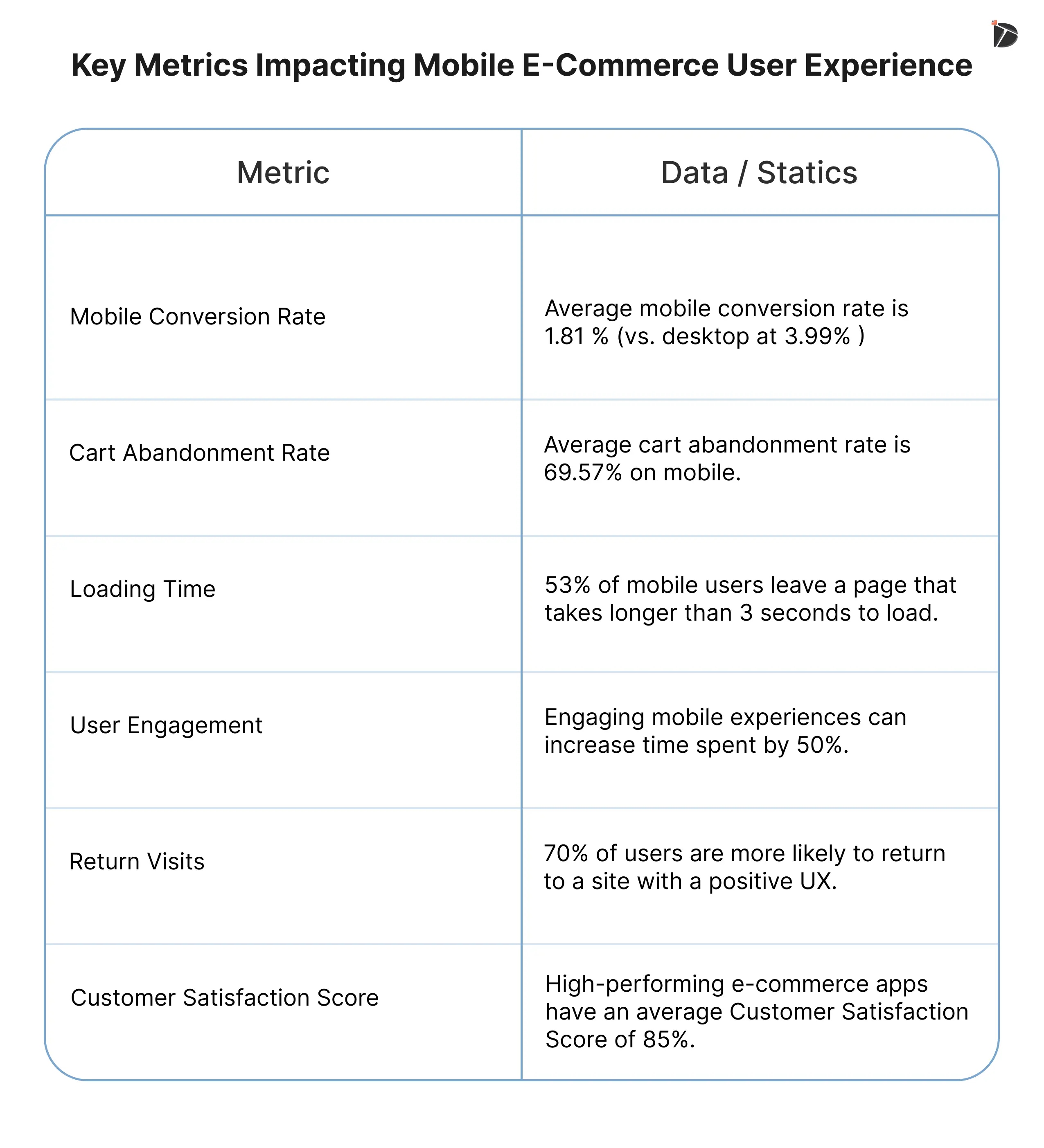
Trends and Innovations in Mobile App Development for E-Commerce
As the e-commerce landscape continues to evolve, innovative technologies are transforming how consumers shop. Mobile app development is at the forefront of this change, creating more engaging and personalized experiences. From immersive visualizations to smart recommendations, these ecommerce technology trends are reshaping customer interactions with brands, making shopping more straightforward and enjoyable.
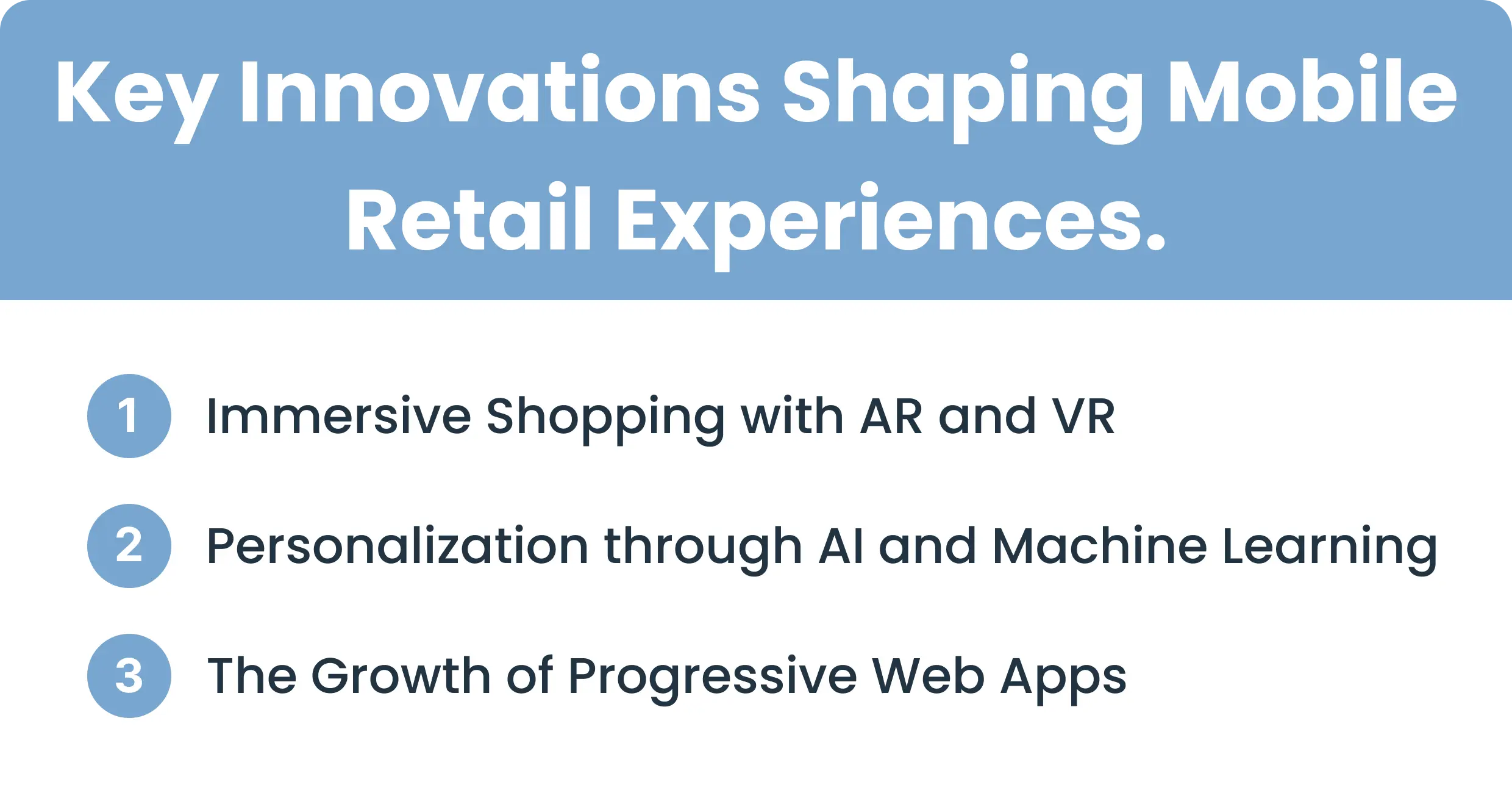
1. Immersive Shopping with AR and VR
An exciting trend in mobile shopping is the use of augmented reality (AR) and virtual reality (VR) technologies. These innovations allow shoppers to visualize products in their own environments before making a purchase. This immersive experience enhances the shopping process, making it more interactive and enjoyable, and enables customers to explore products in a fresh and engaging way.
2. Personalization through AI and Machine Learning
Another key trend in the e-commerce landscape is the use of artificial intelligence (AI) and machine learning to personalize shopping experiences. By analyzing customer data and shopping habits, AI-driven apps can recommend products that align with each person’s preferences. This customized approach is one of the significant ecommerce technology trends today, as it not only helps shoppers find what they’re looking for but also boosts sales and customer satisfaction.
3. The Growth of Progressive Web Apps
Progressive web apps (PWAs) are becoming more popular in e-commerce as one of the key ecommerce technology trends. They combine the best features of websites and mobile apps, providing fast loading times and the ability to work without an internet connection. It offers a smooth shopping experience on different devices, making them a great option for e-commerce businesses looking to reach more customers while maintaining high performance.
Importance of Understanding E-Commerce Innovations
In today’s fast-paced digital landscape, e-commerce innovations are crucial for businesses aiming to thrive and remain competitive. Understanding these innovations is essential for several reasons:
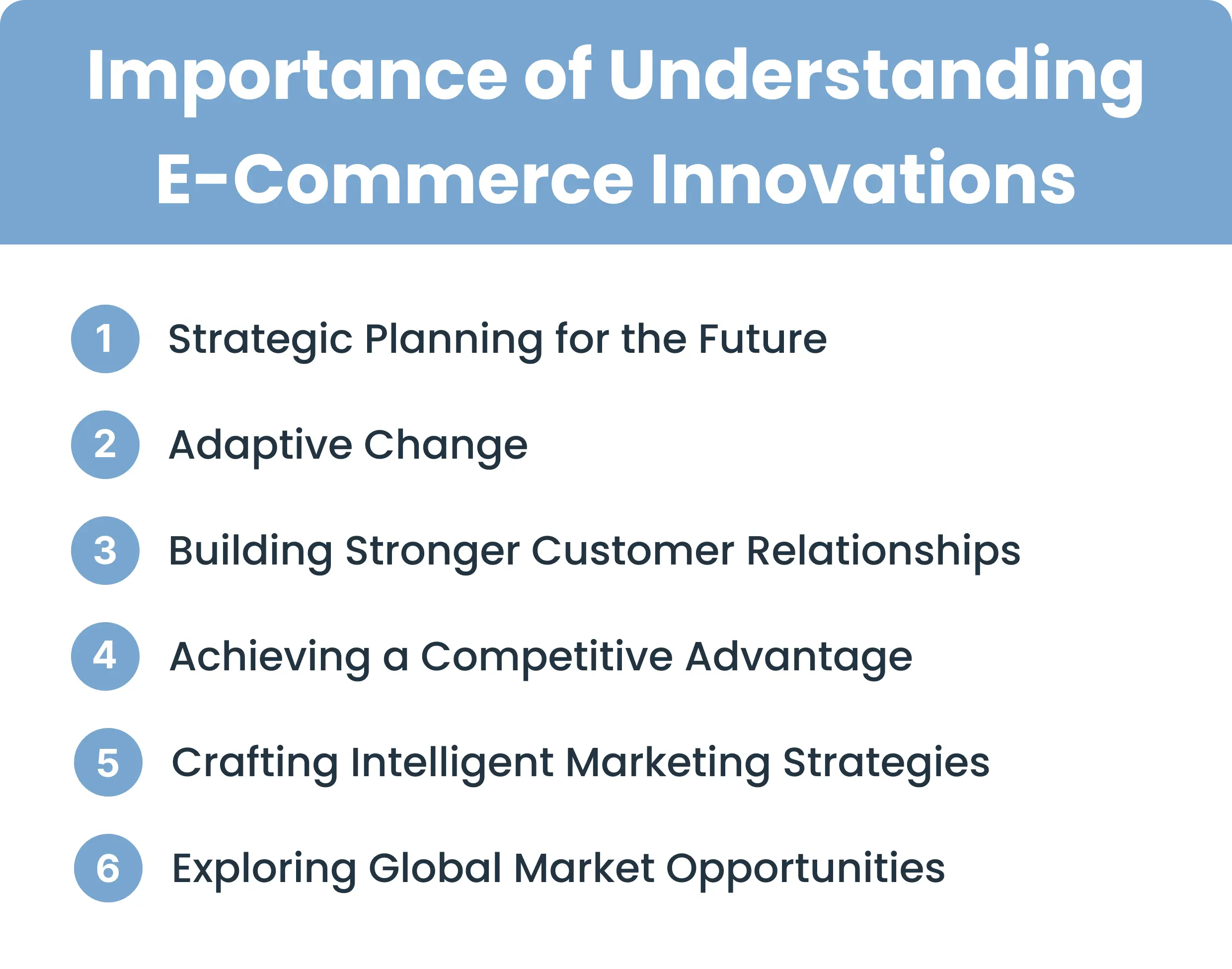
1. Strategic Planning for the Future
Looking ahead at the future of online shopping helps businesses get ready and shape their plans to meet customer needs. By staying aware of trends, companies can prepare early and grab new sales opportunities when they come up, making sure they stay ahead in the market.
2. Adaptive Change
The world of online shopping is always changing due to new technology and changes in how people shop. By understanding these shifts, businesses can quickly adjust and take advantage of new opportunities. This flexibility helps them stay strong and succeed in a fast-moving environment.
3. Building Stronger Customer Relationships
By spotting and accepting new trends, businesses can better meet their customers’ needs. This connection helps build trust and strong relationships. When customers feel understood and appreciated, they are more likely to come back, which helps the business grow over time.
4. Achieving a Competitive Advantage
In a busy marketplace, knowing about the latest changes in online shopping gives businesses a big advantage. Companies that come up with new ideas and meet customer needs are more likely to get noticed. This active approach not only draws attention but also helps them build a reputation for being innovative.
5. Crafting Intelligent Marketing Strategies
Future trends have a significant impact on how people shop, making it essential for businesses to adjust their marketing strategies. By aligning their advertising with these changes, companies can create targeted campaigns that resonate with the right customers. Staying aware of ecommerce technology trends allows businesses to enhance their marketing efforts, making them more effective and ultimately increasing sales.
6. Exploring Global Market Opportunities
E-commerce trends frequently go beyond borders, helping businesses reach customers around the world. By adopting these trends, companies can expand their market and find new opportunities while serving different types of customers. This global approach boosts growth and sets businesses up for long-term success.

The Future of E-Commerce with Mobile App Development
The future of e-commerce with mobile app development looks bright, with ongoing growth and exciting new ideas as technology improves and customer needs evolve. A key focus will be on creating smooth and connected shopping experiences, both online and in stores. Features like click-and-collect services, helpful in-store navigation tools, and customized offers are important ecommerce technology trends that will make shopping easier for customers, no matter where they are.
We can also expect big improvements in personalization thanks to AI technology. This means that mobile apps will provide specific product recommendations based on each shopper’s preferences and browsing history. By understanding their customers better, e-commerce businesses can build stronger relationships, resulting in higher engagement and loyalty. Additionally, as mobile technology advances, we’ll see more features like voice shopping, secure biometric login, and easy payment options, making mobile shopping even more convenient and safe.
In summary, the growth of mobile e-commerce is changing how people shop online, leading to a greater need for mobile app development among businesses. These apps offer many benefits, including improved user experiences, better security, and helpful insights into customer behavior. As ecommerce technology trends like AR/VR, AI personalization, and seamless shopping experiences continue to grow, businesses that adopt these innovations will be better prepared to succeed in a competitive market driven by mobile technology.
Conclusion
In conclusion, the advancements in mobile app technology are not just improving the shopping experience, they are changing the entire e-commerce landscape. As we look to the future, businesses that take advantage of these innovations will not only meet customer expectations but also create unique and engaging shopping experiences that build loyalty. By using mobile capabilities, companies can simplify operations, personalize interactions, and ultimately boost growth. The path forward is clear: investing in mobile innovations is essential for succeeding in the ever-changing world of e-commerce, ensuring that businesses remain competitive and relevant in a digital-first marketplace.


